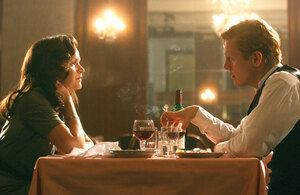Foreign film highlights true brutalities of war
Forget Tarantino and his Basterds — the real ruthless Nazi killers of World War II can be found in the Danish import Flame & Citron.
Based on the actual story of two Danish resistance fighters in Nazi-occupied Denmark who come to be known as Flame and Citron, the film chronicles the efforts and accomplishments in their mission to brutally gun down Nazi officers as well as anyone else thought to be working with the Germans.

War and peace · Danish director Ole Christian Madsen’s award-winning film, Flame & Citron, centers on two resistance fighters — nicknamed Flame (Thure Lindhardt) and Citron (Mads Mikkelsen) — working for the Holger Danske during World War II. Flame & Citron is based on actual events and eyewitness accounts of acts committed by the Holger Danske, a resistance group that started in Denmark in 1942, and was responsible for numerous sabatoges and murders of Nazi soldiers. Though Flame & Citron opened in Denmark in spring 2008, the film just made its way to the US and is now playing at the Laemmle Music Hall, Beverly Hills. - Photos courtesy of IFC Films
The film opens with this startling depiction as the pair effortlessly shoots a Nazi in the middle of a crowded street and, as the film progresses, the killings become more frequent, ultimately affecting the two central characters with forever-damaging consequences.
Directed and co-written by Ole Christian Madsen, the film features a cast mostly unkown to American audiences, with the only exception being the film’s two lead actors, who have both had small roles in recent major Hollywood films.
Mads Mikkelsen — who portrays Citron — is best known in America as well as in Great Britain as the villain in the James Bond film Casino Royale, but he has also appeared in numerous Danish films over the last few years. With each of these films, his ability has improved considerably, and it is in Flame & Citron that he finally becomes unstoppable.
Citron’s partner, the ever-coldhearted Flame, also carries the same weight. Played by Thure Lindhardt, who recently appeared in Angels and Demons as well as Into the Wild, matches Mikkelsen’s intensity and makes watching the two of them act together on-screen a sheer joy.
A great example is a small scene — one that lasts merely 10 seconds — in which the two are shown sitting together in a bar after another successful killing and there is not a word spoken between them. All they do is smoke a cigarette and eventually sit back in their chairs, yet the style and appropriate emphasis on what is not being said make the scene astonishingly powerful.
These two characters are men who are plagued with so much anxiety that they continue to endure and accept, especially as they come to the realization of how out of hand their actions become as the film progresses. Their lives are completely altered by their continual violence, so much so that they ultimately epitomize the very evil they are trying to stop.
What truly makes Flame & Citron a terrific film is that it is not really a war film. It is set during the war, but the true message of the film touches on so much more than military affairs and strategies. With every new Nazi victim, Flame & Citron become just as ruthless as the Nazis, and, by the end of it all, there is really no difference between the supposed good guys and the very evil bad guys.
That is what really legitimizes Flame & Citron as a far superior film to Quentin Tarantino’s Inglourious Basterds. Both films share similar plot lines, but not perspectives. Tarantino portrays cruelty towards Nazis as a deserving attribute, when really it is a horrible ideology.
Flame & Citron plays with the rationality of good discovering that it is becoming evil, and because of this the film excels.
There is a fantastic line, spoken by the leader of the Gestapo as he is involved in a gunfight with Flame, in which he states: “We are the same. You love Denmark and I love Denmark.” This line, among many others, solidifies the accountability that must be shared by good and evil. Both are endearingly capable of horrific extremes, and this idealogy is displayed quite vividly in the film.
The pragmatic horror of not being able to distinguish right from wrong takes center stage, and each character, whether a Nazi or a resistance fighter, feels the effect. By highlighting the shady gray area between what is right and what is wrong, Flame & Citron stands out among recent World War II films — including Tarantino’s Inglourious Basterds.
The combination of this effect — as well as a brilliant cast and a production crew that does not hold anything back — makes Flame & Citron a film not to be missed.
